Heavy duty truck salvage yards often carry a variety of vehicles and construction equipment. Some businesses resell complete vehicles, while others carry junked vehicles which are sold for used parts. A heavy duty truck junk yard is often different from a car or truck junk yard because these yards deal exclusively in large work trucks and commercial vehicles. In this article, I will share with you my experience with the heavy duty truck salvage yards near me.
Map of Heavy Duty Truck Junk Yards Near Me
For “Heavy Duty Truck Salvage Yards Near Me” or “Heavy Duty Truck Junk Yards Near Me”, see the map below…
If your results above seem limited, you can broaden your search or you can look at truck junkyards near me. A truck junkyard tends to be a mix of construction trucks, big rigs, trailers, and heavy duty pickups, but sometimes have lightweight pickup trucks. Sometimes you may find a mix of other heavy duty construction vehicles like bulldozers, bobcats, boom cranes, trailers, bacos, etc. I also see quite a few heavy duty vehicles at GMC yards and some big rigs at Volvo yards.
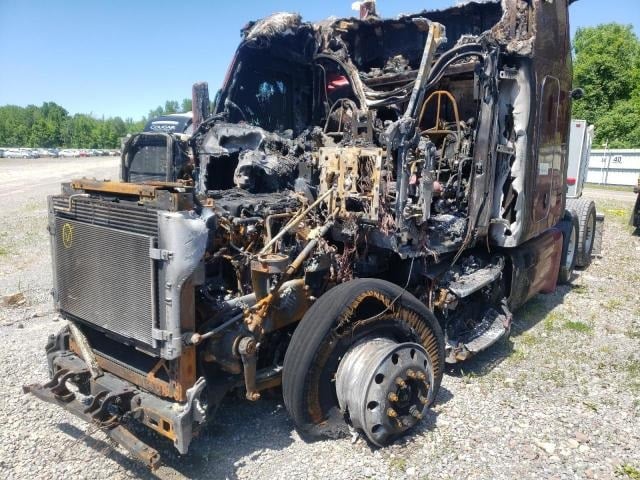
How Heavy Duty Truck Salvage Yards Near Me Work…
These businesses run like any other junkyard, which is at the local level. They buy and sale heavy duty trucks, vehicles, and construction equipment.
The primary source of these vehicles for the salvo is from commercial businesses that perform heavy duty work in some capacity. Often times these vehicles get scrapped because they are outdated, inoperable, or not worth the cost of repair. They may also end up getting junked if the company is going out of business and can’t find a suitable buyer fast enough to pay the banknote. Junking your commercial vehicle is a quick way to get some cash towards purchasing a new one.
Another source of these vehicles is from insurance companies. If for example a big rig is in an accident and it’s deemed totaled, the insurance co will take the rig and sell it to a heavy duty truck junkyard to offset the payout on the insurance claim.
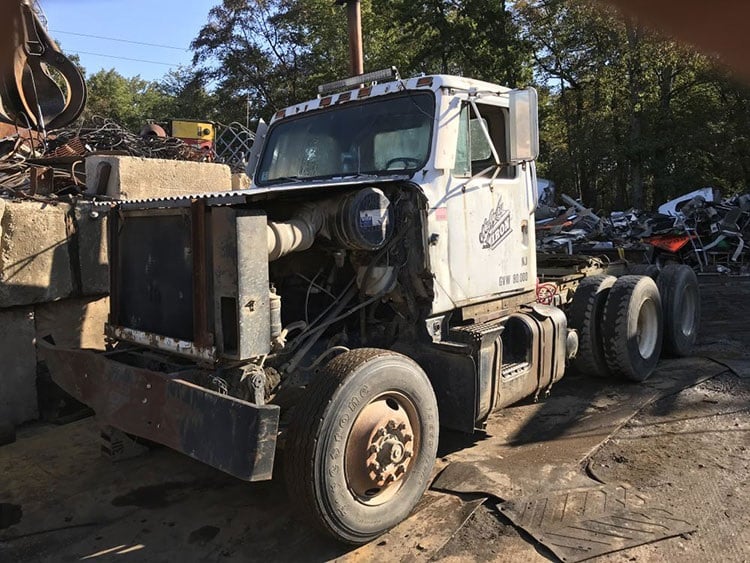
How the Truck Salvage Yards Near Me are Arranged
In the heavy duty truck salvage yards near me, there is no logical order in sorting through the lot. At some yards, you can find vehicles grouped together like a section for tow trucks, a section for box trucks, a section for cement mixers, and a section for big rigs. Some even have a section for trailers. Inside of these sections, all of the manufacturers are mixed together so your Volvo, Peterbilt, and Mack’s, aren’t sorted. The more the yard is organized logically the better it is for you to find the parts you need.
Finding The Salvage Parts You Need…
It’s possible that some of the construction vehicle salvage yards will maintain an online database. If they do have one, this will let you search by manufacturer, model, and year to see if the yard has what you need. If they don’t have a searchable database, it’s best to call ahead and ask questions like: “Do you have a 2004 Mack CX613 hood”?
How Does a Heavy Duty Truck Junkyard Manage Its Inventory
At a heavy duty truck junkyard, every vehicle is first processed with some basic prep work. Often the first step is to drain all the primary fluids. This includes gas (unleaded or diesel), antifreeze, and windshield wiper fluid. These liquids will be containerized and resold at a discounted price. Fluids like oil will be drained and recycled. In some lots, they will pull out the battery and even the motor. If the motor is pulled it gets sent away to be rebuilt and resold with a warranty.
Once the vehicle prep work is complete it gets put out on the lot. Depending on the condition of the vehicle it may be sold outright or turn into a pick and pull for parts. After a heavy duty vehicle is stripped down to the frame some salvage yards will sell what’s left to a scrap metal plant, and others let the vehicle rust. A well-maintained junkyard will turn over its inventory every four to six months.
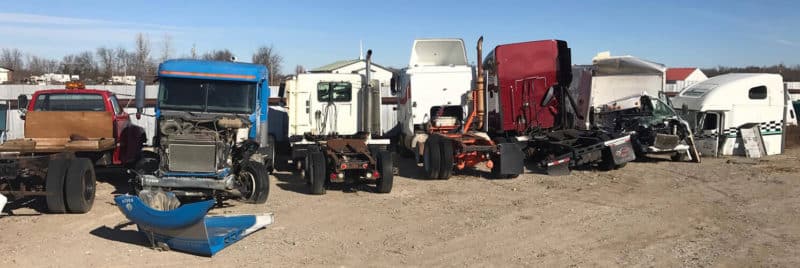
Selling Your Heavy Duty Truck to a Salvage Yard
If you are ready to sell your heavy duty truck, construction equipment, or farm vehicle, you should think through your options carefully. You should ask yourself the following questions:
- Can the vehicle be fixed? If yes, how much will it cost?
- What is the resale value with the repairs completed?
- What is the resale value without the repairs completed?
Answering these questions will help you determine the best course of action to get the most value from your vehicle. Here are your options:
- Fix the vehicle and keep it
- Fix the vehicle and sell it independently
- Don’t fix the vehicle and sell it independently
- Fix the vehicle and junk it for cash
- Don’t fix the vehicle and junk it for cash
In my experience selling heavy duty vehicles independently nets you a higher rate of return. This is however difficult if you don’t have the market. Sites like eBay and Craigslist can be helpful to market your vehicle to a larger audience.
Checklist To Do
If you have decided that you are going to junk your heavy duty equipment, do the following first:
- Remove all of your personal belongings
- Return the plates to the DMV if it’s a street vehicle
- Cancel your registration and insurance
- Siphon the gas for your own reuse
- Find your title because you will need to sign it over
- Look up the value of your Heavy Duty Truck Kelly Blue Book
Negotiating and Selling Considerations
When selling the vehicle it is important to properly assess its condition and to be honest when negotiating the asking price. If you are negotiating over the phone you may be asked to provide pictures of the truck.
Sometimes negotiating a price for your vehicle can be a bit awkward. There are salvage yards that don’t negotiate in good faith. For some additional advice and things to watch out for when selling to a junkyard, read this article here.
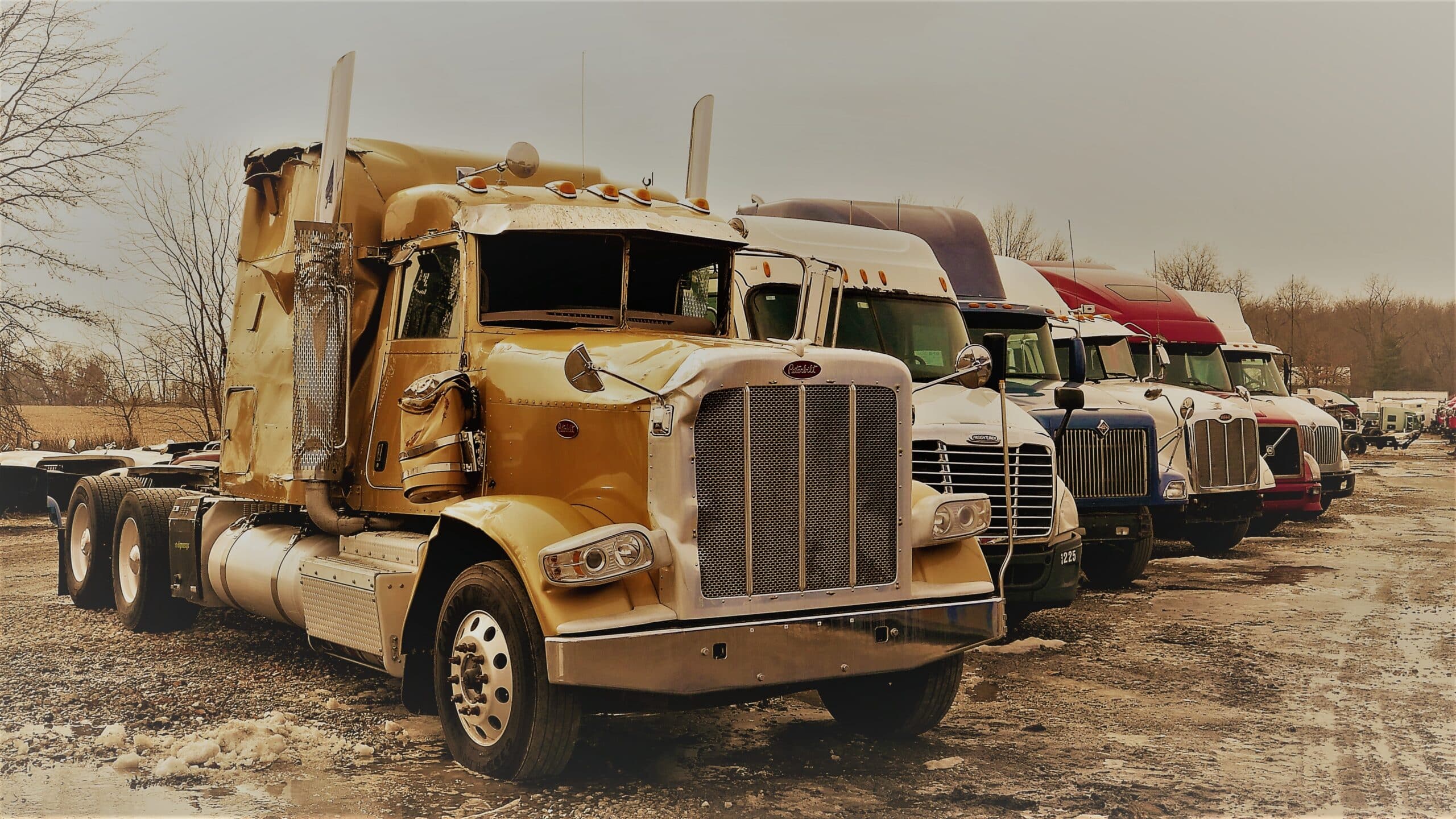
Paperwork to Sell My Heavy-Duty Truck to A Salvage Yard
When selling your heavy-duty truck to a salvage yard, you’ll generally need to gather a few crucial documents. Most importantly, you’ll require the vehicle’s title and registration, which prove your ownership. Additionally, some salvage yards may request a bill of sale to document the transaction. It’s essential to research and communicate with the specific salvage yard you plan to work with, as requirements can vary from one place to another and may depend on local regulations and the salvage yard’s policies. Having the correct paperwork ready ensures a smoother and more efficient sale process for your heavy-duty truck.
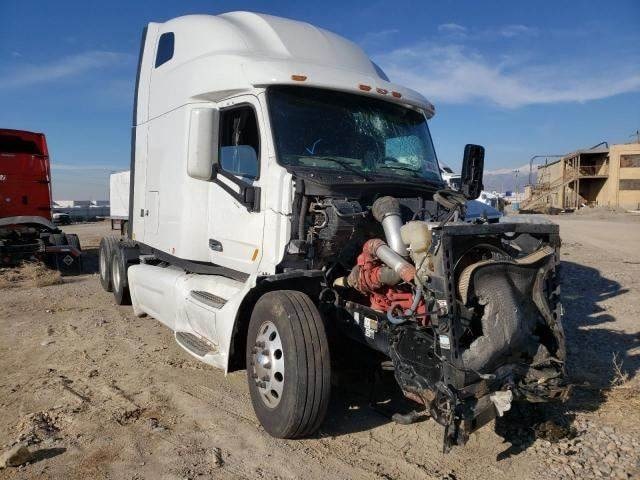
Used Heavy Duty Truck Parts in Scrap Yards
Pros of Buying Used Heavy Duty Truck Parts
The Cost Savings and Abundant Variety
The money you will save buying used parts is the biggest pro. Not only will you save money, but the variety of parts available to you is endless.
Potential Warranties for Added Assurance
Additionally, there is the potential option of getting a warranty. Some salvages offer warranties for $10 to %15 per part. This is a good idea to get one if the piece you are buying is expensive. For the most part, 30 days is the common time period for exchange or credit.
Access to Manufacturer Assembled Parts
Lastly, a great perk is that you can often find manufacturer-assembled parts. These are original pieces, not after market and not fabricated.
Disadvantages of Buying Used Parts from the Junkyard
Quality and Warranty Considerations
The first concern is always quality. These heavy duty trucks have likely had many hours logged on them and have been exposed to high capacity loads. Even a thorough visual inspection and a test of the part can’t guarantee that the part isn’t going to fail. To protect yourself in the short term, getting a warranty on any parts you feel are expensive is advised.
Challenges with Salvage Lot Organization
Another disadvantage is the salvage lot itself. Heavy duty truck lots are notorious for their lack of structure. You can spend all day looking for parts or vehicles that aren’t even on the lot. To bypass this check to see if the lot has a searchable database, if not call them and ask for what you are looking for.
Fabricated Parts and Customization Challenges
A last disadvantage is you will find a lot of fabricated parts. Many places that own these vehicles operate their own maintenance garages so they can fix their vehicles when they break down. Trying to determine if a piece has been fabricated or customized in some way can be difficult depending on the piece.
Discover Heavy Duty Truck Salvage Yards Near You for the Best Deals on Aftermarket Truck Parts
Looking for heavy-duty truck parts, whether they are aftermarket parts or used truck parts, can be a time-consuming endeavor, but Heavy Duty Truck Salvage Yards near you can save you both time and money.
These salvage yards boast an extensive inventory of heavy truck parts, including engines, transmissions, and custom build components. Whether you’re in need of semi-truck parts or specialized John Deere equipment, they often have what you’re looking for at the best prices. By choosing to shop at these salvage yards, you not only save time but also contribute to recycling efforts, making them an eco-friendly choice for heavy-duty truck enthusiasts. So, explore your local Heavy Duty Truck Salvage Yards and find the perfect aftermarket parts or used truck parts for your custom build or repair project.
Heavy Duty Truck Salvage Yards Near Me Conclusion
If you are looking to save money on heavy duty truck parts then a junkyard is the way to go. These places will help you find hard-to-find parts, manufacturer-assembled parts, and get a short term warranty on them. Whether you have a big rig, large truck, or even a tractor or farm equipment it’s worth taking a look at one of these yards.
If you are selling your heavy duty truck you need to properly assess the value and be familiar with how to negotiate. That’s my experience from the Heavy Duty Truck salvage yards near me.
